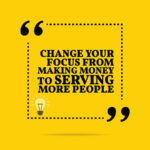Subconscious and unconscious are similar terms that are often used interchangeably. In fact, you can compare the two words to suppression and repression.
Your subconscious, or unconscious, is what keeps you alive. It is a body system that never rests. The subconscious, or unconscious, is what keeps your heart beating, your blood moving throughout your body and your digestive system functioning. The subconscious manages all of your body’s vital processes and important functions.
What is the Unconscious Mind?
The unconscious mind is the part of your thinking process that inhibits highly unpleasant memories. It basically hides them from your conscious thought. According to one author, the unconscious part of the mind hides “socially unacceptable ideas, wishes and desires, traumatic memories and painful emotions that have been repressed.”
How can you control your subconscious to become more successful in your personal and professional life? Here are five tips.
1. Notice and Block Negative Self-Talk
Kids usually learn things by repeating what they’re told out loud. This is something that people continue doing. They just start saying it to themselves in their heads instead. Most adults have an endless inner monologue. Research shows that an estimated 95% of the thinking and cognition that people use to make decisions happen at the unconscious level.
Your inner monologue can say good things or negative things. If you’re struggling to complete a job or learn a new skill, your inner monologue may be a stream of negative thoughts. First, notice when you’re thinking something negative about yourself and stop it. Then, think something positive. Over time, it will become automatic, but you will need to practice this technique.
Along with not letting your own negative self-talk depress you, don’t let other people’s negative thoughts affect you either. Don’t permit another person to block your productivity. It is time to stop caring what others think about you or what you want to do.
2. Begin Each Day with a Daily Affirmation
People often make good intuitive decisions when they’re not functioning at their highest level. This means that in some cases, conscious thought seems to get in the way of good decisions. Letting the unconscious mind weigh in on decisions might help you make better ones.
Begin every day by telling yourself out loud that you have what it takes to be successful today. The more you do this, the more your subconscious mind will believe you. You’re planting a seed in your unconscious.
Choose something simple like “Each day, I’m becoming better.” Another option is the Metta Prayer, which is “May I be happy. May I be well. May I be safe. May I be at peace.”
Paraliminals and Ultimate You Library
Improve any aspect of your life in 20 minutes a day – even while you’re sleeping!
3. End Each Day with an Intention
Thomas Edison said, “Never go to sleep without a request to your subconscious.” One thing that many successful people do is intentionally direct their subconscious during times of rest.
Before you go to bed, take about 10 minutes to meditate on what you want to accomplish tomorrow and in general. If you’re not sure where to start, ask yourself a few questions that relate to your goals. Write them down and be as specific as possible. Once you fall asleep, your subconscious will begin figuring out what to do.
According to research, the creative part of your brain is at its best when you first wake up. During sleep, your subconscious strolls around your mind figuring things out. Creativity is the process of forming connections between different areas of your brain. Often, your brain is best able to be creative after quality sleep.
Keep a journal on your nightstand, and when you wake up, take 10 minutes to write down as many of your thoughts as you can. This type of thought drop can help you connect to a higher level of clarity, creativity and learning.
4. Give Yourself Time to Relax
People often have their greatest thoughts at unusual times when they’re not even trying to have an amazing idea. These ideas might come when you’re taking a shower or driving home from work. When you have a great idea during an unexpected activity, use your phone to take a few notes.
Once you start working at managing your subconscious thoughts, your brain will begin coming up with more creative solutions. Researchers have discovered that people form better decisions when they use both unconscious and conscious thought.
5. Realize that Many Decisions are Unconscious Ones
You might think that your purchasing decisions are conscious choices, but most of these decisions come from the subconscious mind. Buying urges are usually driven by emotion. This is the case in other things as well.
Humans have a number of unconscious biases, ones that they are unaware of. People usually have an affinity bias, which means that they subconsciously like some people more than others based on similar backgrounds or character traits.
Cultural bias is another unconscious element that people experience. In this case, humans stereotype one another according to where they’re from without considering their talents or how they actually perform.
Confirmation bias can also impact your decisions at the unconscious, or subconscious, level. When confirmation bias happens, it allows you to go along with something even if you have misgivings just because everyone else approves.
Biases cause problems in the workplace. Unconscious bias can cloud your judgment and cause you to make choices that could negatively impact your career or your personal life. Take the time to discover your unconscious biases and get rid of them. Doing so will help you create a workplace that’s more productive.
Get Where You Want to Go
Becoming acquainted with the workings of your inner mind can help you get where you want to go in both your personal and professional life. If you need help with direction, contact us at the Productivity Intelligence Institute. We can help.






